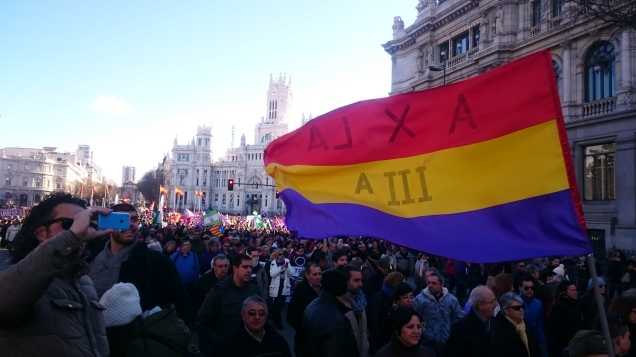The post-2008 political landscape in Europe has been littered with public discontent and protest. In Spain and Greece this has manifested itself in revolt against the European establishment and a refusal to be bound by the financial practices of the past. In England, immigration has raced to the forefront of the political agenda, while in Scotland and Catalunya nationalism has come to the fore in a way that would have been unimaginable only a few years ago. In France the National Front has eroded support for the rightwing UMP while simultaneously appealing to much of the working class. Even Germany has not been immune to an element of political unrest.
Although the principles underlying these movements may differ greatly, it would be foolish not to wonder if there is a common denominator running through European protest. If history has taught us anything it is that the lines separating socialist uprisings from fascist popularity are not as clear as we may like to think. Political movements often thrive on the charisma of their leaders and their ability to build a narrative that chimes with the misery or discontent of the public. In Germany’s broken socioeconomic structure of the 1920’s it could easily have been the communists who came to power on a wave of popular support instead of the National Socialists. But the Nazis were more adept at political maneuvering and public manipulation. One of the many lessons available from this episode however is that most individuals are not remotely concerned with political ideology. Instead they back parties that offer the best guarantee of personal and collective security. This security can and does take many shapes, but it is the desire to protect one’s self and one’s security that is at the core of electoral and public decision-making. But electoral decisions are also often made with rejection in mind – rejection of the incumbent political force and policies. Under these circumstances, a clear and workable alternative vision matters less, since the public desire to oust those who have led them into darker times will often be sufficient to create political change. This is the predominant theme in modern politics and since voters are often hard pressed to identify the core differences between candidates, a vote for one is largely just a rejection of the other.
But the current wave of demonstrations across Europe is about something greater than electoral choice, it represents a rejection of modern politics. The SNP, UKIP and the Catalan nationalists may promote very different ideals but all try to tap into the disenchantment of voters in the face of globalised, neoliberal politics administered from a distant centre of power. All seek to recapture a real or imaginary notion of local identity from the clutches of external bureaucratic institutions. All offer a vision of the future which appeals to those who want a greater say in shaping their local culture and society. As citizens feel increasingly distant from the centre of power they strive to have a greater say in organising their communities in a way which is consistent with their own beliefs and identity rather than those of policymakers in London, Madrid or Brussels.

